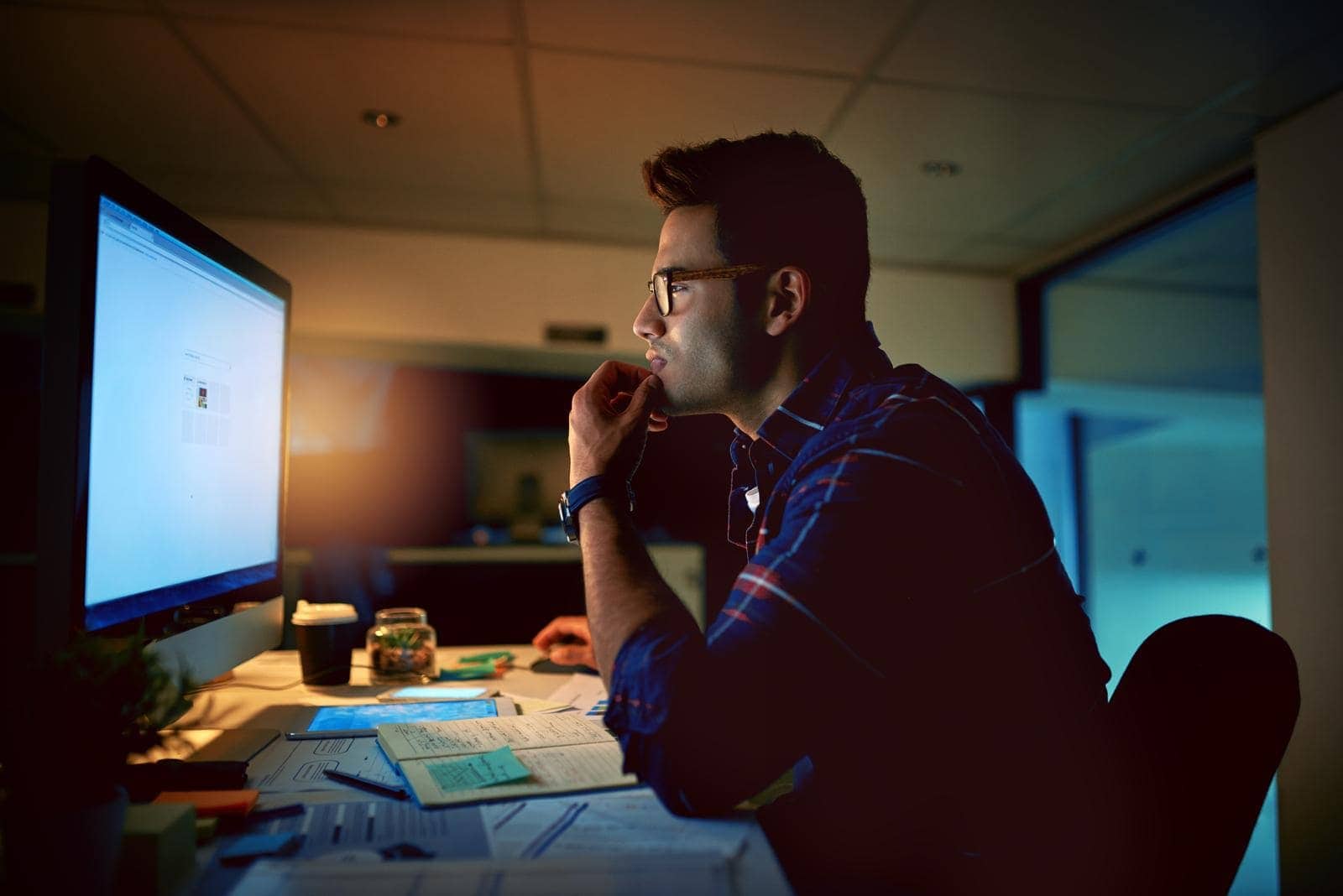Updated on May 3, 2024
Blue Light and Your Eyes: Effects and Risks


Vision Center is funded by our readers. We may earn commissions if you purchase something via one of our links.
Modern life is filled with electronic devices that emit blue light. On a given day, you might work on a laptop, watch TV, and swipe through apps on a smartphone. But did you know that all this screen exposure can harm your eyes?

Too much blue light from digital devices can lead to problems like blurred vision, macular degeneration, and digital eye strain. It can also disturb your body’s natural wake-sleep cycle (circadian rhythm).
This article explains how exposure to blue light affects your eyes and what you can do to protect them.
What Is Blue Light?
Blue light is part of the visible light spectrum. This is what the human eye can see.
Blue light vibrates within the 380 to 500-nanometer range. It has the shortest wavelength and the highest energy of visible light.1
Around one-third of visible light is considered high-energy visible or blue light. Sunlight is the most significant source of blue light.
Artificial sources of blue light include:
- Fluorescent light
- Compact fluorescent light (CFL) bulbs
- LEDs
- LED televisions
- Computer screens
- Smartphones
- Tablet screens
Where to Buy Glasses + Contacts
Best Overall: Warby Parker
Fastest Delivery: EyeBuyDirect
Also Great: Liingo
Best Place to Buy Contacts: Discount Contacts
How Does Blue Light Affect Your Eyes?
Blue light is next to ultraviolet (UV) on the electromagnetic spectrum. Although the eye’s cornea and lens can block most UV rays before they reach the retina, visible blue light passes through.

Animal studies show that direct and prolonged exposure to blue light damages cells in the light-sensitive retina.4 However, no studies can confirm this effect on humans.
Eye doctors state there is little proof that blue light exposure from digital devices damages the retina.4 LED devices are still relatively new. No long-term studies have shown how blue light may affect your eyes during your lifetime.8
Risks of Blue Light on Eye Health
Current research suggests that exposure to blue light from electronic devices likely doesn’t pose a severe risk to your eyes.4 However, there are still some risks to consider:
1. Age-Related Macular Degeneration (AMD)
Age-related macular degeneration (AMD) causes vision loss in the center of your field of vision. Details and objects in the middle of your sightlines become blurry. Over time, they may become impossible to see.
Animal and lab studies have questioned whether blue light can speed up AMD. However, researchers don’t believe there’s a link between using LED digital device screens and AMD.4
2. Digital Eye Strain (Computer Vision Syndrome)
Using digital screens up close or for long periods can cause digital eye strain, also called computer vision syndrome.6
People who use digital devices tend to blink less often than usual. Fewer blinks mean less moisture and more strain on the eyes.
Other symptoms may include:
- Eye dryness
- Sore or irritated eyes
- Tired eyes
- Headaches
- Facial muscles fatigued by squinting
3. Disrupted Sleep Patterns
Blue light exposure may affect your sleep-wake cycle, called the circadian rhythm.
Light sensors in your eyes and skin can tell the difference between daylight and nighttime. Bright daylight has intense blue waves. Warmer, redder tones indicate that the day is ending.
When the light around you settles into sunset shades, the sensors in your eyes trigger your body to release its natural melatonin stores. Melatonin is a sleep-inducing hormone.
When you experience blue light exposure in the evening, your body doesn’t release as much melatonin as usual. As a result, your sleep cycle is delayed or disrupted.7
4. Other Risks
Other problems may develop from harmful blue light, including:
- An increased risk of hormone-related cancers. For example, breast and prostate cancers10
- Lower levels of leptin. This is a chemical that signals fullness following meals11
- Metabolic changes. Especially blood sugar levels
How to Protect Your Eyes From Blue Light
The following steps may help reduce the risks of exposure to blue light:
1. Take Frequent Breaks
When using a device that emits blue light, stop every 20 minutes. Try focusing on objects that are around 20 feet away. Study those objects for 20 seconds before returning to screen time.
2. Keep Your Eyes Moist
Eye drops and room humidifiers can help keep your eyes from becoming too dry and irritated while using devices.
3. Use Prescription Eyeglasses
Squinting at screens for extended periods is not healthy for your eyes.
If you need eyeglasses to correct your vision, wear the right prescription for the distance between your eyes and the screen. This is ideally arm’s length away. Most glasses are designed for longer distances.
4. Adjust the Blue Light on Your Screen
To lessen the risk of eye strain and sleep issues, try setting your screens to a night shift setting or dark mode. The night shift setting typically uses warmer tones.
5. Try Blue Light Screen Filters
You can buy blue light filters such as screens for your computer screen when working at night. These filters can reduce the glare from your screen.
Blue light filtering screens can block blue light up to 30 to 60 percent.12 However, it’s unclear if blocking blue light helps improve the sleep-wake cycle for those who use back-lit screens before bed.
6. Use Blue Light-Blocking Lenses
Blue light blocking glasses contain lenses designed to reduce the blue light that reaches the eyes.
These lenses filter blue light rays to help stop them from entering your eyes. Blue light lenses usually have a slightly yellow tint to counterbalance blue light.
What Devices Produce Blue Light?
Blue light is all around us. Today, people are exposed to more blue light than ever. This is due to the widespread use of devices with light-emitting diode (LED) technology.
The following devices produce high amounts of blue light:
- Laptop and computer screens
- Flat-screen televisions
- Cell phones
- Tablets
Summary
Some health experts are concerned that large amounts of prolonged blue light exposure may damage your eyes.
Blue light damages cells in laboratory animals, but no research suggests it damages human eyes. It can also affect your body’s ‘sleep-wake’ cycle. This is why it’s recommended to reduce exposure before bed (or use amber-light mode).
Other ways to protect your eyes from too much blue light include filters or special glasses blocking blue light. Reducing blue light exposure from digital devices is best by limiting screen time and taking frequent breaks.
In this article
12 sources cited
Updated on May 3, 2024
Updated on May 3, 2024
About Our Contributors
Ellie is a full-time freelance writer with a diverse portfolio in the medical field, including a focus on optometry. She crafts content in areas such as dentistry, addiction, mental health, and eye care. Her mission is to produce authoritative and research-backed optometry content, guiding readers to take care of their eyesight and seek necessary treatments.
Dr. Melody Huang is an optometrist and freelance health writer with a passion for educating people about eye health. With her unique blend of clinical expertise and writing skills, Dr. Huang seeks to guide individuals towards healthier and happier lives. Her interests extend to Eastern medicine and integrative healthcare approaches. Outside of work, she enjoys exploring new skincare products, experimenting with food recipes, and spending time with her adopted cats.






